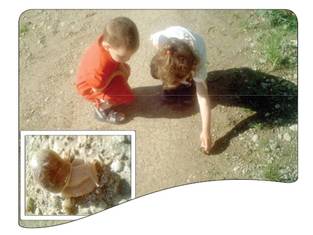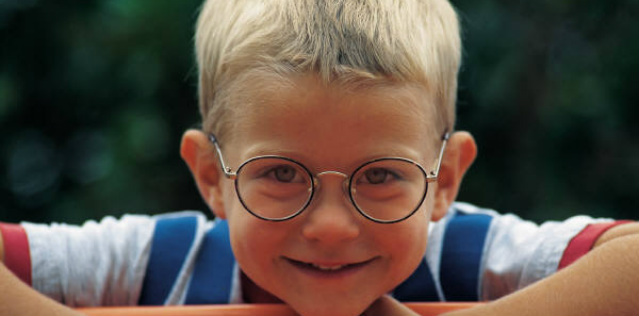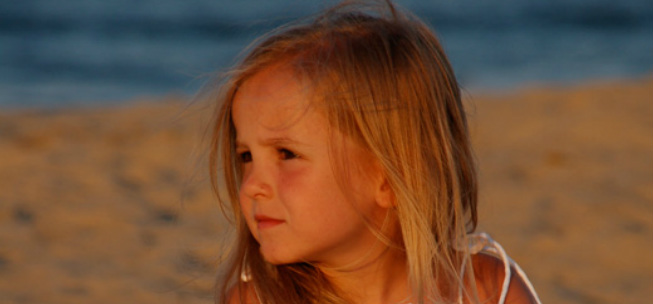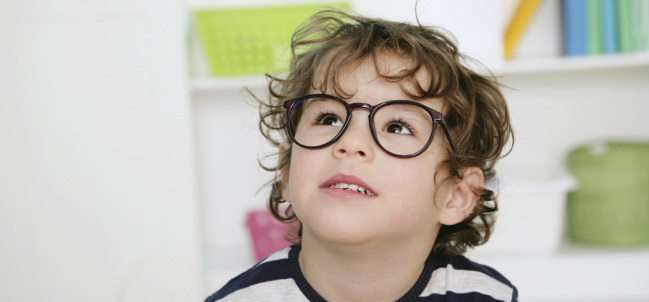|
Most adults have looked at a child blissfully enjoying playtime, and have, for a moment, wished they were children again. They look so peaceful, so happy, with hardly a care in the world. Children laugh easily, they enjoy what they do, and they get excited about the simplest things. They generally have minor, very temporary worries that rarely last more than a few minutes or an hour. They likely spend so much more time than you do just being happy and engaged. Why do kids appear to be so much more at peace? Obviously, they have a whole lot less work to do, but that’s not the root of the reason. What gives them so much peace of mind and heart is not so much the absence of work as it is the almost complete absence of fear of the future. The younger children are, the less apt they are to fear the future. As children grow older, they’re introduced to more problems and pressures, and soon they’re worrying a bit about their report card, then they’ll start looking in the mirror and wondering if they’ll be ugly when they grow up. When they start approaching adulthood, the worries about the future mount up, and in some cases begin to overshadow the excitement about the simple things of life. Before they know it, they’re adults with full responsibilities, and many fears and worries. Fear and worry about the future unfortunately becomes a part of the life of an adult, to varying degrees, depending on how much someone is prone to worry. Some people have more responsibility, therefore more to worry about. Others are more apt to fear due to their personalities. Others fear and worry due to negative experiences in the past, but in the end everyone worries on occasion. Everyone has to deal with fears and worries on a regular basis, whether about your work, your children, your health, or your job. Obviously you can’t become so much like a little child that you have no responsibilities or work to accomplish, and you just play “make-believe” all day, but you can still learn from children’s example of living more for the moment and enjoying the simple things in life. Here are some examples of the simple joys of life that are so often overlooked:
Take a nice, deep breath. Take another one. Now take a few minutes and think of happy stuff. Forget your troubles. Forget your day. Appreciate the good things in life. Feels good, doesn’t it? Or if it doesn’t feel good yet, it will as you become more like a child and make it a habit to enjoy the simple things in life. Enjoy life all throughout—not in several short, powerful bursts. Spend time laughing with others and loving them, not bossing them around, working out problems, or competing with them. Love, live—enjoy something every single day. Every day! © TFI. Used with permission.
0 Comments
 One of the most precious gifts any of us could ever receive is to become a parent and receive God's love in the form of a little child, so sweet and beautiful. They're all His children, really, but He entrusts them to our care and wants us to love and train them. They're a gift of God but, like flowers in our garden, we've got to take care of them. It's a case of God's gift also being God's work. God Himself has set the example of how He wants us to be with our children. He is just and merciful and loving and patient, but He also deals with us firmly when He sees that we're getting off the track. He is a loving God, but He's also a very good Father who knows how to correct us when we need it. If we teach, train, and lead our children right and set the right example, they will carry that all through life. "Train up a child in the way he should go: and when he is old, he will not depart from it" (Proverbs 22:6). "All your children shall be taught by the Lord, and great shall be the peace of your children" (Isaiah 54:13). - David Berg, courtesy of Activated Magazine. By Chalsey Dooley It was just a little thing, that smile on my baby's face, but it changed my perspective on life. As he woke and looked up at me, he was looking at what mattered most in the world to him—me! He didn't care that his diaper needed changing or that I was dressed in mismatched pajamas, my hair a mess. He just loved me and loved being with me. He didn't need perfection; love made it all right. That moment of holding him and taking in those rays of love clarified something I'd been thinking about earlier. The lack of perfection in life has always rubbed me the wrong way. When someone said or did something that irked me, I'd often argue my case against it in my mind. Why do there have to be things like personality clashes, carelessness, inconsideration, injustice, pessimism, putdowns? These things are real, and they are wrong! I wish these things wouldn't exist. If everyone, myself included, could just get their act together, my life could be one of blissful perfection. Perfection, I reasoned, was the only thing that could ever relieve my irritations. But I also knew that could never be. This was real life. I needed another option. The more I thought about it, the more I realized that what I really wanted was for the world to revolve around me—my wishes, my feelings, my preferences, my priorities. Something had to change, and this time it had to be me, regardless of the faults of others. But how? I'd tried before. Then that morning, as I held my baby, a whisper of a thought came to me. Would you want your baby to be perfect right from the start? After pondering that thought, I couldn't imagine something I'd want less. If he'd been able to walk and run the day he was born, I'd never get to see the look of thrill and accomplishment on his face when he took his first steps, and I'd also miss that special feeling of holding him in my arms, knowing that he was completely dependent on me. If he had been able to talk perfectly from the time he was born, I'd never experience the joy of hearing him speak his first word. If he knew everything that an adult knows, I'd never get to see him overcome with wonder at some new discovery and I'd never have the fulfillment of teaching him something new. So many things I'd miss. No, his imperfection makes him just perfect. I wouldn't have him any other way! What is it then, I asked myself, that makes his imperfection different from the other imperfections around me? And the answer came. It's love. That was it! That was what I was lacking. That was what I needed more of in order to cope bravely and cheerfully when confronted by problems I wished didn't exist. Think how much you'd miss if you and everyone around you were perfect from the start. You'd miss the unpredictability of life that adds the sense of surprise; the joy of forgiving and being forgiven; the strong, abiding bonds of friendship that are formed through adversity, and the positive character traits that are formed much the same way. Adding negative thoughts to a negative situation, I realized, never brings positive results. I determined then and there to look for and find the positive opportunities and experiences that are hidden behind the mask of imperfection. When my baby couldn't sleep later that day, I decided to make the best of a difficult situation by putting my new lesson into practice. I put what I had been sure was best for him and me on hold, and my husband and I took some time to sing and laugh with him. It was a perfectly happy moment that we all would have missed had everything been "perfect" that day. Originally published in Activated Magazine. Used with permission.  By Jay Phillips Today I went for a walk with some of my friends’ kids in the countryside surrounding the village in which we live, an area consisting of agriculture fields, dirt paths, and small woods. The weather was great, so it was a good opportunity for the kids to get some fresh air and exercise as they ran around looking for little creatures that are abundant in spring and summer. Time can seem to stand still while out in nature—at least until the kids excitedly holler, “Ladybug!” or “Spider!” But even such sudden alerts are okay, because just a few minutes of peace is usually all I need to clear my head. Then I’m ready to jump back into action and run into the bushes to get a photograph of the latest “cool bug” they found and to take in the moment with these little exploring minds. When Jesus said that unless you become as little children you cannot enter the kingdom of Heaven (Matthew 18:3), maybe He wasn’t just talking about Heaven to come, but also about the peace and little bit of heaven we experience in our hearts here and now when we take the time to put our cares aside, quiet our minds and spirits, and tune in to His voice speaking to us through creation. The children I was with seemed to do that naturally. They weren’t worried about the work that still needed to get done back home, or the bills that needed to be paid; they were simply full of energy, excited about life, and happy to have a big guy along to watch out for them and take snapshots of their activities. How much more peace should we have, knowing that we have the ultimate Big Guy looking out for us and, I’m sure, taking snapshots of our lives too? © The Family International. Used with permission.
By Marie Claire
About a week before my son Tristan's fourth birthday, I talked with him about how much he had grown up in the past year, how much he had learned, and how proud I was of him for the progress he had made. Then we talked about his birthday and what he wanted to do for his party. As usual, I let him choose what kind of birthday cake he wanted. Last year he chose a "caterpillar" cake, as at the time bugs fascinated him. That cake wasn't too difficult--just a string of crescent-shaped cake pieces with bright, multicolored icing. I expected him to choose something equally simple this year, so you can imagine my chagrin when, after looking through a book with imaginative cake ideas for children, he chose the "knights and castle" cake. I looked at the detailed drawing, read over the explanation, and felt immediately that I had bitten off a bit more than I could chew. But Tristan was sure he wanted a castle cake, knights and all. Before I knew it, his birthday was upon me, and I set to work on the cake. Book in hand, I tried to follow the directions as best I could, but soon realized why there was only a drawing of this castle cake, not a photograph, as with most of the other designs. There was a gulf between concept and finished product, and I was adrift and sinking! My cake was lopsided, the icing didn't stick well, and the turrets weren't equal in height or diameter. I couldn't find any toy knights, so I settled for a Lego figure of a man on a horse. I felt so under pressure and discouraged! Poor Tristan, I thought. He's going to be so disappointed! He's been looking forward to and talking about his knights and castle cake all week, and now look what he's going to get! Things never turn out the way I want them to! Tristan is sure to be one unhappy little boy when he sees his mother's version of his dream cake! I finally finished the cake, adding the final touches as best I could--paper flags, cookies along the top of the walls that were supposed to look like stones but kept falling over at awkward angles, and "grass" made from shredded coconut dyed with food color that somehow turned out a muddy mossy color. I was done, but felt like crying. I cleaned up my mess and decided I'd better let Tristan see the cake, to prepare him for the embarrassing moment when he and his friends would see it at the party. As Tristan entered the room, I studied his expression and prayed for just the right thing to say to cheer him up and help him not to take it so hard. Tristan's eyes widened and, to my surprise, a huge smile spread across his face. "Wow, Mom! It's so cool!" he exclaimed. "It's just what I wanted!" I nearly burst into tears as he went over to the cake, inspected each part, and said it was exactly the way he wanted it to be. Then he ran over and hugged me, thanked me for making it for him, and lifted his hand to his mouth as if to tell me a secret. I bent over to let him whisper in my ear. "I love you!" he said, and then ran off to tell his friends about what he'd just seen. After he left the room I sat there a while, thinking about what I'd just experienced. In those few minutes I was taught a lesson that can take a lifetime to learn. How many times had things in my life turned out differently than I had hoped or imagined? How many times had my dreams seemed to turn out a little lopsided, distorted, with pieces missing? How many times had I questioned God and not fully accepted or appreciated what He had done for me? Oh, that I can learn to see life through the eyes of a child--full of faith, hope, love, and positiveness, instead of seeing the imperfections. Oh, that I can learn to see the good and the wonder of it all. I stayed in that magic moment as long as I could. Drinking in the scene of that misshapen cake before me and the fresh memory of Tristan's sweet reaction, I asked God to forgive me for my recent negative outlook on life and to help me see things the way my son had seen that cake. Then a funny thing happened. As I stared at the cake, it took on a cartoon quality and I actually began to like it! Best and most important, Tristan liked it. It was his birthday, after all. Originally published in Activated Magazine. Used with permission. My daughter is almost three years old, and she's started something new: the "Mommy, I'm scared" phase. For example, she has become frightened of dogs—even our docile old family dog—and she asks questions like, "Does the dog have sharp teeth?" and "Do dogs eat little girls?" Even the sound of a dog barking in the distance is enough to send her running indoors. No amount of reassurance seems to help. How can I help my little girl overcome her fears?
Fear can be a serious problem for anyone at any age, but especially for young children because their frame of reference is quite limited and they haven't yet developed the reasoning capability to determine which fears are rational and which are irrational. It takes prayer, patience, understanding, and wisdom on the part of parents to know how to help their children learn to deal with fear. One point to keep in mind is that some fears are normal, rational, and healthy. Some are with us from birth, such as fear of loud noises and fear of heights. Other rational fears are learned through experience. For example, a child who has been stung by a bee is likely to be afraid of bees. Other rational fears are learned through parental warnings, such as fear of hot stoves, sharp knives, and moving cars. On the other hand, irrational fears, such as fear of imaginary monsters, don't have any basis in the material world. Many childhood fears fall somewhere between the rational and irrational, and they are usually linked to a particular phase of the child's mental and emotional development as he or she is exposed to new experiences and learns to reason and exercise imagination. It's very important not to make light of children's fears, as that won't make them any less fearful; it will only add a level of shame and low self-worth to the difficulty they are already facing. To make them feel that it's wrong or that they're being bad when they're afraid, as though they had a choice in the matter, will only compound the problem. The first step to helping children overcome their fears is to take the matter to Jesus in prayer. Ask Him to fill your child with the light of faith to overcome the darkness of fear. Also pray an upbeat prayer with the child, focusing on God's faithful, loving care. Because every child and every situation is different, it helps to ask Jesus to show you what to do to help your child overcome the fear. He can show you the cause of the problem, the best solution, and how to present it to the child. For example, He may show you to relate a similar situation that happened to you when you were small, when everything turned out fine. Or He may tell you to read your child a story in which someone overcame a similar fear. He will probably also remind you to not expect overnight results. Weaning children from irrational fears takes time, but love and prayer never fail.  By A.A. I was a scrawny, asthmatic eight-year-old living in India with my family in the early 1980s when an old family friend visited and informed me with a smile that she had taken care of me when I was a baby. I felt a special link with her. As she reminisced with my parents, I knelt behind her and silently braided her honey-colored hair. It was my first attempt at braiding, and it turned out quite loose and unsymmetrical. But when I finished and I asked her how she liked it, she felt the back of her head and said, "It's lovely! And it's much more comfortable in this heat. Thank you for doing that for me." An eight-year-old who thought she wasn't very good at many things gained a sense of worth and learned the reward of helping others in little ways. A year or two later, also in India, we went for an all-day outing up a local "mountain" with a thousand stone steps. My asthma forced me to rest often, but it was worth the effort. When we reached the top, we explored a fascinating old museum that had once been a magnificent palace and observed the lifestyle of bygone Indian royalty in the carefully preserved, fully furnished rooms and lush, immaculately kept gardens. The next day our teacher asked us to write an essay about our excursion, and I became completely absorbed in painstakingly documenting every event of the day—the hike up the mountain, the monkeys we met on the way and how they took peanuts from our hands and ate them, the massive statue of a fierce warrior at the entrance of the palace, and every detail of the palace itself. I was pleased with my essay and so was my teacher, but she gently explained that it's usually better to not begin every sentence with "then." She suggested some alternatives, and I liked the way they sounded. Such constructive criticism and collaboration were new concepts to me, but the encouragement and help I received that day steered me toward a fulfilling career in writing and editing. So whether you're are a parent, teacher, caregiver, or "bystander," never underestimate the influence you have on the children who share your world. Sometimes all it takes is an approving smile or an encouraging word to change a young life, and the love you give will come back to you. What many people fail to realize is that the world of tomorrow is what the adults of today make it, according to what they choose to give or not give the next generation. —David Brandt Berg Courtesy of Activated magazine. Used with permission.
Ariana Andreassen My son Anthony is a bright, active, three-year-old who loves to learn new things. A while back, his favorite topic of conversation was lightning. He never seemed to tire of talking about storms, about how buildings sometimes catch fire when hit by lightning, and so on. When he began acting out those scenarios with his Playmobile people and Lego blocks, I channeled his thoughts and energy more positively by teaching him about how Benjamin Franklin had invented the lightning rod to avert such disasters. A few months later, Anthony paused in the middle of dinner, gave me a thoughtful look, and said something about how some animals are now endangered because they don’t have enough food or a place to live. I was curious to know if he actually understood what he was talking about, so I asked him why the animals had nowhere to live. He explained that because people are building houses and roads and cutting down trees in the process, animals like koala bears have nowhere to go. Of course, it was a bit muddled, but I could see that he’d gotten the general point and was genuinely concerned that animals were losing their natural habitat. This subject occupied his focus for a few weeks, until the next wonderful discovery came along. I think that was the traditional five senses. Through talking with my son about Benjamin Franklin, endangered species, and the five senses, I realized how easy it is to influence children when they’re young, and therefore how important it is to teach them to make wise, responsible decisions. Children get excited about doing their part to help improve their world, and we can instill in them a love and respect for the environment from an early age. Anthony is now passionate about sorting recyclable trash into the proper receptacles, watering plants, and tending the garden. He knows that walking rather than taking the car, when practical, saves money and doesn’t pollute, and he is getting better than I am at remembering to turn off lights when leaving a room. Though it takes time in the beginning to explain concepts in ways children can understand and relate to without getting them worried or upset, it’s worth it. It’s a joy to see my little one putting thought and effort into caring for the world around him, rather than abusing it or taking it for granted. Ariana Andreassen is a teacher and mother of two in Thailand. Courtesy of Activated magazine. Used with permission. |
Categories
All
Archives
March 2024
LinksFree Children's Stories |






 RSS Feed
RSS Feed
